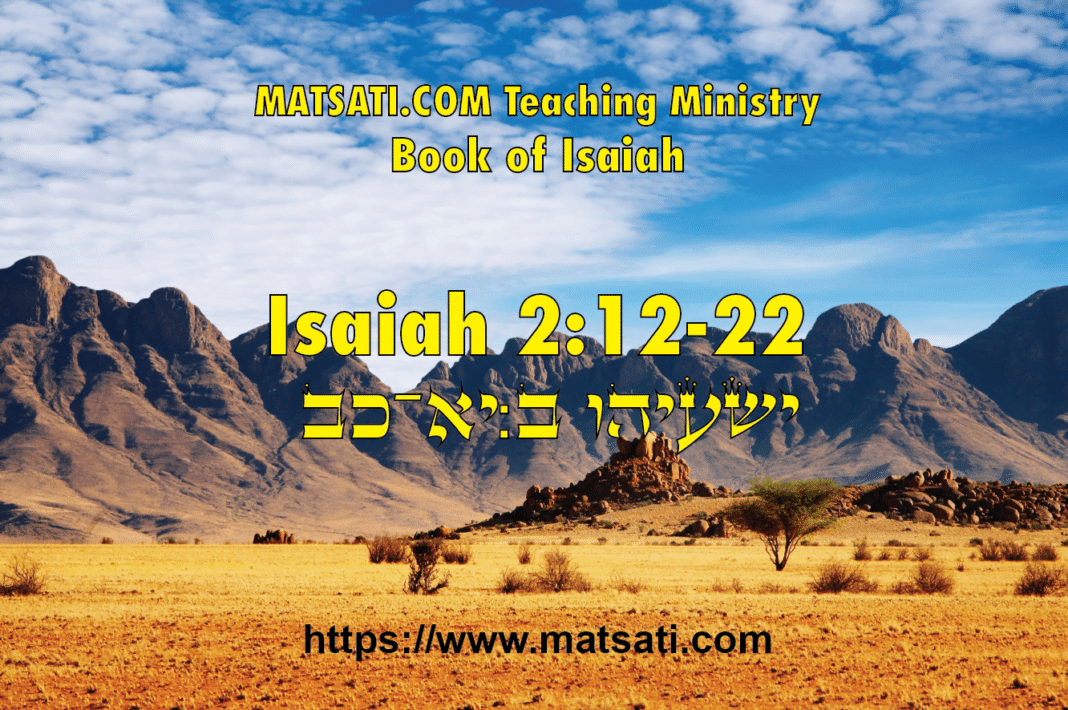Table of Contents
Introduction to Isaiah 2:12-22
The opening passages of Isaiah 2 speak of the mercy of God towards His people, as showing them mercy to draw them back to the Lord and of Jerusalem becoming great and from her will go forth God’s Torah (instruction). Within this promise God is making to Israel, he will lift Israel up to become a light to the nations and teach all people the Drech Hashem, the way of God. Isaiah states that God is over all, he is high and exalted. Anyone who lifts themselves up in pride, who exalts themselves will be brought low. This is synonymous to one being humiliated or humbled as it says according to Isaiah 2:9. This is how Isaiah continues according to 2:12.

ספר ישעיה פרק ב
יב כִּ֣י י֞וֹם לַיהוָ֧ה צְבָא֛וֹת עַ֥ל כָּל־גֵּאֶ֖ה וָרָ֑ם וְעַ֖ל כָּל־נִשָּׂ֥א וְשָׁפֵֽל׃
Isaiah 2:12 states, “For the day of the LORD of hosts (כִּ֣י י֞וֹם לַיהוָ֧ה צְבָא֛וֹת) shall be upon every one that is proud and lofty, (עַ֥ל כָּל־גֵּאֶ֖ה וָרָ֑ם) and upon every one that is lifted up; and he shall be brought low: (וְעַ֖ל כָּל־נִשָּׂ֥א וְשָׁפֵֽל)” The principle point that is being taught here is of being humble before God. This reminds us of John the Baptist according to Luke 3. He was preaching about baptism and the remission of sins. Then we read according to Luke 3:4 As it is written in the book of the words of Esaias the prophet, saying, The voice of one crying in the wilderness, Prepare ye the way of the Lord, make his paths straight. 3:5 Every valley shall be filled, and every mountain and hill shall be brought low; and the crooked shall be made straight, and the rough ways shall be made smooth; 3:6 And all flesh shall see the salvation of God. (KJV) He quotes from Isaiah 40:4 Every valley shall be lifted up, and every mountain and hill made low; the uneven ground will become smooth, and the rugged land a plain. (KJV) where Isaiah 40:1-5 speaks of the coming of the Lord, and of even the mountains being brought low in the presence of God. Here Isaiah speaks of י֞וֹם לַיהוָ֧ה צְבָא֛וֹת “the day of the Lord of Hosts.” This phrase י֞וֹם לַיהוָ֧ה / י֣וֹם יְהוָ֑ה occurs frequently in scripture (Isaiah 2:12, 13:6, Jeremiah 25:33, 46:10, Ezekiel 13:5, 30:3, Amos 5:18, 5:20, Joel 1:15, 2:1, 2:11, 2:31, 3:14) several times in the New Testament (e.g. Acts 2:20; 1 Corinthians 5:5; 2 Corinthians 1:14; 1 Thessalonians 5:2; 2 Thessalonians 2:2; 2 Peter 3:10). The day of the Lord according to the Tanakh (תנ”ך) is a time of God’s judgment and a time of dealing with the world and sin. In the passages concerning י֣וֹם יְהוָ֑ה there always appear to be a sense of imminence and expectation. Such as what Isaiah 13:6 states “for the day is near, even the day of the Lord is near.” Joel states “let all who live in the land tremble, for the Lord is coming. It is close at hand.” And what Ezekiel 30:3 says, “for the day is near, even the day of the Lord is near.” Joel 3:14 says, “Multitudes, multitudes in the valley of decision! For the day of the Lord is near in the valley of decision” and Zephaniah 1:7 states, “Be silent before the Lord God! For the day of the Lord is near.” What is particularly interesting about these various references is the idea of there being a near fulfillment and a farther more distant fulfillment. Prophecy has this dual purpose and fulfillment, a present day or near and a future expectation. Some prophecies in the Tanakh speak of the last days at the end of the age (Joel 2:30-32, Zechariah 14:1, Malachi 4:1, 4:5). Other prophecies have had their historical fulfillment. (Isaiah 13:6-22, Ezekiel 30:2-19, Joel 1:15, 3:14, Amos 5:18-20, Zephaniah 1:14-18) In the Apostolic Writings (NT) this day is known as the day of wrath, or visitation, or the great day of the Lord (see Revelation 16:14) which speak of a future day. The word of God also states in a few places that “the day of the Lord” will come quickly, like a thief in the night (Zephaniah 1:14-15, 2 Thessalonians 2:2). What these things reveal to us is how we are to be watchful and ready for the coming of the Messiah at any moment. Paul writes that this great day will also be a day of salvation according to Romans 11:26. This day of salvation results in the forgiveness of sin and the restoration of His chosen people to the Land of Promise. (Isaiah 10:27, Jeremiah 30:19-31, 40, Micah 4, Zechariah 13) The point of Isaiah 2:12, “For the day of the LORD of hosts (כִּ֣י י֞וֹם לַיהוָ֧ה צְבָא֛וֹת) shall be upon every one that is proud and lofty, (עַ֥ל כָּל־גֵּאֶ֖ה וָרָ֑ם) and upon every one that is lifted up; and he shall be brought low: (וְעַ֖ל כָּל־נִשָּׂ֥א וְשָׁפֵֽל)” is that we are to be aware that at a future time there will be a reckoning with God. A future time at which we will give an account for the life that we lived here on earth! Isaiah continues to speak of the extent of one’s pride as he says the following:
ספר ישעיה פרק ב
יג וְעַל֙ כָּל־אַרְזֵ֣י הַלְּבָנ֔וֹן הָרָמִ֖ים וְהַנִּשָּׂאִ֑ים וְעַ֖ל כָּל־אַלּוֹנֵ֥י הַבָּשָֽׁן׃ יד וְעַ֖ל כָּל־הֶהָרִ֣ים הָרָמִ֑ים וְעַ֖ל כָּל־הַגְּבָע֥וֹת הַנִּשָּׂאֽוֹת׃ טו וְעַ֖ל כָּל־מִגְדָּ֣ל גָּבֹ֑הַ וְעַ֖ל כָּל־חוֹמָ֥ה בְצוּרָֽה׃ טז וְעַ֖ל כָּל־אֳנִיּ֣וֹת תַּרְשִׁ֑ישׁ וְעַ֖ל כָּל־שְׂכִיּ֥וֹת הַחֶמְדָּֽה: יז וְשַׁח֙ גַּבְה֣וּת הָאָדָ֔ם וְשָׁפֵ֖ל ר֣וּם אֲנָשִׁ֑ים וְנִשְׂגַּ֧ב יְהוָ֛ה לְבַדּ֖וֹ בַּיּ֥וֹם הַהֽוּא׃ יח וְהָאֱלִילִ֖ים כָּלִ֥יל יַחֲלֹֽף׃
Isaiah 2:13 states, “And upon all the cedars of Lebanon, (וְעַל֙ כָּל־אַרְזֵ֣י הַלְּבָנ֔וֹן) that are high and lifted up, (הָרָמִ֖ים וְהַנִּשָּׂאִ֑ים) and upon all the oaks of Bashan, (וְעַ֖ל כָּל־אַלּוֹנֵ֥י הַבָּשָֽׁן)” Isaiah 2:14 “And upon all the high mountains, (וְעַ֖ל כָּל־הֶהָרִ֣ים הָרָמִ֑ים) and upon all the hills that are lifted up, (וְעַ֖ל כָּל־הַגְּבָע֥וֹת הַנִּשָּׂאֽוֹת)” Isaiah 2:15 “And upon every high tower, (וְעַ֖ל כָּל־מִגְדָּ֣ל גָּבֹ֑הַ) and upon every fenced wall, (וְעַ֖ל כָּל־חוֹמָ֥ה בְצוּרָֽה)” Isaiah 2:16 “And upon all the ships of Tarshish, (וְעַ֖ל כָּל־אֳנִיּ֣וֹת תַּרְשִׁ֑ישׁ) and upon all pleasant pictures. (וְעַ֖ל כָּל־שְׂכִיּ֥וֹת הַחֶמְדָּֽה)” Isaiah 2:17 “And the loftiness of man shall be bowed down, (וְשַׁח֙ גַּבְה֣וּת הָאָדָ֔ם) and the haughtiness of men shall be made low: (וְשָׁפֵ֖ל ר֣וּם אֲנָשִׁ֑ים) and the LORD alone shall be exalted in that day. (וְנִשְׂגַּ֧ב יְהוָ֛ה לְבַדּ֖וֹ בַּיּ֥וֹם הַהֽוּא)” Isaiah 2:18 “And the idols he shall utterly abolish. (וְהָאֱלִילִ֖ים כָּלִ֥יל יַחֲלֹֽף)” We note the various ways in which Isaiah speaks to the pride of man, as the cedars in Lebanon (אֶת־אַרְזֵ֥י הַלְּבָנֽוֹן), the oaks of Bashan (אַלּוֹנֵ֥י הַבָּשָֽׁן), high mountains (הֶהָרִ֣ים הָרָמִ֑ים), high towers (מִגְדָּ֣ל גָּבֹ֑הַ), on every fenced wall (חוֹמָ֥ה בְצוּרָֽה), and the ships of Tarshish (אֳנִיּ֣וֹת תַּרְשִׁ֑ישׁ). The Cedars of Lebanon are mentioned over 70 times in the Bible. Under David’s United Kingdom (1051 – 931 BC), King Hiram I of Tyre gave Cedars of Lebanon to David. Cedar wood was especially desirable for its aromatic qualities as well as its resistance to decay and bugs. According to Ezekiel 31, Assyria is paralleled to the cedars of Lebanon.

ספר יחזקאל פרק לא:ג-יא
הִנֵּ֨ה אַשּׁ֜וּר אֶ֣רֶז בַּלְּבָנ֗וֹן יְפֵ֥ה עָנָ֛ף וְחֹ֥רֶשׁ מֵצַ֖ל וּגְבַ֣הּ קוֹמָ֑ה וּבֵ֣ין עֲבֹתִ֔ים הָיְתָ֖ה צַמַּרְתּֽוֹ׃ מַ֣יִם גִּדְּל֔וּהוּ תְּה֖וֹם רֹֽמְמָ֑תְהוּ אֶת־נַהֲרֹתֶ֗יהָ הֹלֵךְ֙ סְבִיב֣וֹת מַטָּעָ֔הּ וְאֶת־תְּעָלֹתֶ֣יהָ שִׁלְחָ֔ה אֶ֖ל כָּל־עֲצֵ֥י הַשָּׂדֶֽה׃ עַל־כֵּן֙ גָּבְהָ֣א קֹמָת֔וֹ מִכֹּ֖ל עֲצֵ֣י הַשָּׂדֶ֑ה וַתִּרְבֶּ֨ינָה סַֽרְעַפֹּתָ֜יו וַתֶּאֱרַ֧כְנָה פֹארֹתוֹ מִמַּ֥יִם רַבִּ֖ים בְּשַׁלְּחֽוֹ׃ בִּסְעַפֹּתָ֤יו קִֽנְנוּ֙ כָּל־ע֣וֹף הַשָּׁמַ֔יִם וְתַ֤חַת פֹּֽארֹתָיו֙ יָֽלְד֔וּ כֹּ֖ל חַיַּ֣ת הַשָּׂדֶ֑ה וּבְצִלּוֹ֙ יֵֽשְׁב֔וּ כֹּ֖ל גּוֹיִ֥ם רַבִּֽים׃ וַיְּיִ֣ף בְּגָדְל֔וֹ בְּאֹ֖רֶךְ דָּֽלִיּוֹתָ֑יו כִּֽי־הָיָ֥ה שָׁרְשׁ֖וֹ אֶל־מַ֥יִם רַבִּֽים׃ אֲרָזִ֣ים לֹֽא־עֲמָמֻהוּ֮ בְּגַן־אֱלֹהִים֒ בְּרוֹשִׁ֗ים לֹ֤א דָמוּ֙ אֶל־סְעַפֹּתָ֔יו וְעַרְמֹנִ֥ים לֹֽא־הָי֖וּ כְּפֹֽארֹתָ֑יו כָּל־עֵץ֙ בְּגַן־אֱלֹהִ֔ים לֹא־דָמָ֥ה אֵלָ֖יו בְּיָפְיֽוֹ׃ יָפֶ֣ה עֲשִׂיתִ֔יו בְּרֹ֖ב דָּֽלִיּוֹתָ֑יו וַיְקַנְאֻ֙הוּ֙ כָּל־עֲצֵי־עֵ֔דֶן אֲשֶׁ֖ר בְּגַ֥ן הָאֱלֹהִֽים׃ לָכֵ֗ן כֹּ֤ה אָמַר֙ אֲדֹנָ֣י יְהוִ֔ה יַ֕עַן אֲשֶׁ֥ר גָּבַ֖הְתָּ בְּקוֹמָ֑ה וַיִּתֵּ֤ן צַמַּרְתּוֹ֙ אֶל־בֵּ֣ין עֲבוֹתִ֔ים וְרָ֥ם לְבָב֖וֹ בְּגָבְהֽוֹ׃ וְאֶ֨תְּנֵ֔הוּ בְּיַ֖ד אֵ֣יל גּוֹיִ֑ם עָשׂ֤וֹ יַֽעֲשֶׂה֙ ל֔וֹ כְּרִשְׁע֖וֹ גֵּרַשְׁתִּֽהוּ׃
Ezekiel 31:3-11
31:3 Behold, the Assyrian was a cedar in Lebanon with fair branches, and with a shadowing shroud, and of an high stature; and his top was among the thick boughs. 31:4 The waters made him great, the deep set him up on high with her rivers running round about his plants, and sent her little rivers unto all the trees of the field. 31:5 Therefore his height was exalted above all the trees of the field, and his boughs were multiplied, and his branches became long because of the multitude of waters, when he shot forth. 31:6 All the fowls of heaven made their nests in his boughs, and under his branches did all the beasts of the field bring forth their young, and under his shadow dwelt all great nations. 31:7 Thus was he fair in his greatness, in the length of his branches: for his root was by great waters. 31:8 The cedars in the garden of God could not hide him: the fir trees were not like his boughs, and the chestnut trees were not like his branches; nor any tree in the garden of God was like unto him in his beauty. 31:9 I have made him fair by the multitude of his branches: so that all the trees of Eden, that were in the garden of God, envied him. 31:10 Therefore thus saith the Lord GOD; Because thou hast lifted up thyself in height, and he hath shot up his top among the thick boughs, and his heart is lifted up in his height; 31:11 I have therefore delivered him into the hand of the mighty one of the heathen; he shall surely deal with him: I have driven him out for his wickedness. (KJV)
We note how Ezekiel calls Assyria a cedar in Lebanon and then analogized this to being a tree in the garden of God (Garden of Eden, Paradise). The greatness is described as the one who has great pride. We note the economic value of the cedars of Lebanon, as Tyre and Sidon benefited greatly in wealth due to its export. (1 Chronicles 17:1, 17:6, 22:4) Both Tyre and Sidon were friends of Israel in the days of David and Solomon. Over time however they became the enemy of Israel. The Lord God Almighty later promised judgement to these cities according to Ezekiel 26. What these things remind us of are that God gives us gifts and we are to humble ourselves in recognition of this. The one who does not humble himself will be humbled and face judgement before God.
The oaks of bashan (אַלּוֹנֵ֥י הַבָּשָֽׁן) are mentioned in three places, Isaiah 2 (3X), Ezekiel 27 (9X), and in Zechariah 11 (3X). BASHAN (בָּשָׁן, bashan) is the region in the upper Transjordan known for its fertility. Conquered by the Israelites under Moshes en route to the promised land (Bamidbar / Numbers 21:33–35). The description of the Oaks of Bashan located in Zechariah 11:1-3 explains directly what is meant by their usage.

Zechariah 11:1-3
11:1 Open thy doors, O Lebanon, that the fire may devour thy cedars. 11:2 Howl, fir tree; for the cedar is fallen; because the mighty are spoiled: howl, O ye oaks of Bashan; for the forest of the vintage is come down. 11:3 There is a voice of the howling of the shepherds; for their glory is spoiled: a voice of the roaring of young lions; for the pride of Jordan is spoiled. (KJV)
We note here how the oaks of Bashan are connected to pride, the pride of Jordan. Again Isaiah repeats that these high trees are an analogy to the pride of man, to wealth, to self sufficiency. The point is God does not approve of pride as those who are prideful and do not humble themselves will be humbled. As in the case of the Cedars of Lebanon, due to their pride God delivered the people into the hand of the heathen who shows no mercy when dealing with the people. God says that He drives people from the land due to their wickedness. (Ezekiel 31:11).
The high mountains are a reference to the high places, or a place that has a high elevation. This was often a symbol of power and authority. It could also imply some measure of divine power. In the ancient world, high places, or “the heights,” were viewed as abodes of the gods in some cultures. The high places (בָּמָה, bamah) were sites of worship in the ancient Near East, named after their common location at the summits of hills or ridges. The biblical usage describes these places as places of worship. They are often treated as places the people worshiped that was not sanctioned by God as the place of worship was to be at the Tabernacle. The typical word used in the Tanakh for high place (בָּמָה, bamah) means “height” or “the back of an animal” (the highest part of an animal). The word was used to describe worship sites that were not sanctioned by God. High places were often open, natural areas. However, bamah could also indicate an established structure (see 2 Kings 23:8, Jeremiah 7:31). The בָּמָה, bamah (high places) in Israel were Canaanite in origin as the people did not put away (destroy) the indigenous peoples and their practices as commanded by the Torah. (see 1 Kings 3:2-4, 11:6-8, 14:22-24, 17:9-11, and 23:5-8) The high towers (מִגְדָּ֣ל גָּבֹ֑הַ) reminds us of a ziggurat, which is a large religious structure built in ancient Mesopotamia that took the form of a stepped pyramid. The tower of Babel was likely a type of ziggurat (Bereshit / Genesis 11:4-9). Archaeologists have discovered several ziggurats, including those found in Uruk and Ur. The fenced wall (חוֹמָ֥ה בְצוּרָֽה) reminds us of the fortified cities. The pride of having a wall to protect the people, the strength of the wall to hold back an army, etc. The word מִבְצָר, (mivtsar) is the term generally rendered “fenced” or “defensed city.” In both AV and RV of Isaiah and Jeremiah we find for the most part the more formal “defensed city.” It is found by itself (Isaiah 17:3); with ‘ir, “city” (see 1 Samuel 6:18 and 2 Kings 3:19). These things are all considered that which a man’s pride rests upon as opposed to trusting in God. Note this common theme throughout the Scriptures of trusting in God alone!
The ships of Tarshish (אֳנִיּ֣וֹת תַּרְשִׁ֑ישׁ) reminds us of the fleet of ships built by King Solomon and used to transport his treasures (gold and great wealth). According to Biblical history, Tarshish is the great grandson of Noah! Noah → Japheth → Javan → Tarshish (see Bereshit / Genesis 10:4) Tarshish was a maritime people ( see verse 5) and the place where he settled received his name. Tarshish was a sea-port and very wealthy (Tehillim / Psalm 72:10, Jeremiah 10:9, Ezekiel 27:12, 27:25, Ezekiel 38:13) as most Scriptures refer to ships carrying silver and gold whenever it is mentioned. We also read that the king had a fleet of trading ships manned by Hiram’s servants. Once every three years it returned, carrying gold, silver and ivory, and apes and baboons. (2 Chronicles 9:21) “Tarshish was thy merchant by reason of the multitude of all kind of riches; with silver, iron, tin, and lead, they traded in thy fairs.” (Ezekiel 27:12) Because Tarshish became so wealthy, it relied on its own resources and not on God, and for this reason the city became cursed. (Isaiah 23:1, 23:6, 23:10, 23:14, Tehillim / Psalm 48:7, Ezekiel 27:12, etc) We note how all of these things speak to man’s attempt to self-aggrandize himself. God’s power is so awesome that men will hide themselves from His presence in the rocks, the cliffs, and the caves. (see Isaiah 2:19) The conclusion concerning these verses is that all who are proud will be humbled, and when God appears on that great day, none will exalt himself, only God is exalted! Humility is the ability to be without pride or arrogance, and it is the principle characteristic of those who follow in the footsteps of Yeshua the Messiah! Yeshua led by example, humbling his life unto death. So too we are to humble ourselves to follow in God’s plans for our lives!
ספר ישעיה פרק ב
יט וּבָ֙אוּ֙ בִּמְעָר֣וֹת צֻרִ֔ים וּבִמְחִלּ֖וֹת עָפָ֑ר מִפְּנֵ֞י פַּ֤חַד יְהוָה֙ וּמֵהֲדַ֣ר גְּאוֹנ֔וֹ בְּקוּמ֖וֹ לַעֲרֹ֥ץ הָאָֽרֶץ׃ כ בַּיּ֤וֹם הַהוּא֙ יַשְׁלִ֣יךְ הָאָדָ֔ם אֵ֚ת אֱלִילֵ֣י כַסְפּ֔וֹ וְאֵ֖ת אֱלִילֵ֣י זְהָב֑וֹ אֲשֶׁ֤ר עָֽשׂוּ־לוֹ֙ לְהִֽשְׁתַּחֲוֺ֔ת לַחְפֹּ֥ר פֵּר֖וֹת וְלָעֲטַלֵּפִֽים׃
Isaiah 2:19 states, “And they shall go into the holes of the rocks, (וּבָ֙אוּ֙ בִּמְעָר֣וֹת צֻרִ֔ים) and into the caves of the earth, (וּבִמְחִלּ֖וֹת עָפָ֑ר) for fear of the LORD, (מִפְּנֵ֞י פַּ֤חַד יְהוָה֙) and for the glory of his majesty, (וּמֵהֲדַ֣ר גְּאוֹנ֔וֹ) when he ariseth to shake terribly the earth. (בְּקוּמ֖וֹ לַעֲרֹ֥ץ הָאָֽרֶץ)” Isaiah 2:20 “In that day a man shall cast his idols of silver, (בַּיּ֤וֹם הַהוּא֙ יַשְׁלִ֣יךְ הָאָדָ֔ם אֵ֚ת אֱלִילֵ֣י כַסְפּ֔וֹ) and his idols of gold, (וְאֵ֖ת אֱלִילֵ֣י זְהָב֑וֹ) which they made each one for himself to worship, (אֲשֶׁ֤ר עָֽשׂוּ־לוֹ֙ לְהִֽשְׁתַּחֲוֺ֔ת) to the moles and to the bats; (לַחְפֹּ֥ר פֵּר֖וֹת וְלָעֲטַלֵּפִֽים).” These things remind us of what is written in the Psalms, in Tehillim / Psalms 115:4-8.
ספר תהילים פרק קטו
ד עֲצַבֵּיהֶם כֶּסֶף וְזָהָב מַעֲשֵֹה יְדֵי אָדָם: ה פֶּה-לָהֶם וְלֹא יְדַבֵּרוּ עֵינַיִם לָהֶם וְלֹא יִרְאוּ: ו אָזְנַיִם לָהֶם וְלֹא יִשְׁמָעוּ אַף לָהֶם וְלֹא יְרִיחוּן: ז יְדֵיהֶם | וְלֹא יְמִישׁוּן רַגְלֵיהֶם וְלֹא יְהַלֵּכוּ לֹא-יֶהְגּוּ בִּגְרוֹנָם: ח כְּמוֹהֶם יִהְיוּ עֹשֵֹיהֶם כֹּל אֲשֶׁר-בֹּטֵחַ בָּהֶם:
Tehillim / Psalms 115:4-8
115:4 Their idols are silver and gold, the work of men’s hands. 115:5 They have mouths, but they speak not: eyes have they, but they see not: 115:6 They have ears, but they hear not: noses have they, but they smell not: 115:7 They have hands, but they handle not: feet have they, but they walk not: neither speak they through their throat. 115:8 They that make them are like unto them; so is every one that trusteth in them. (KJV)
Here the word עֲצַבֵּיהֶם comes from the root עצב meaning “to shape, form, to copy” and עָצָב means “idol, false god.” This the work of a man’s hands (מַעֲשֵֹה יְדֵי אָדָם) is inanimate, has ears but can’t hear, eyes but can’t see, can’t walk and smell, or speak. The interesting thing is that the psalmist states that those who make them will be just like them. Those who worship or serve idols will become like them. Note how in Isaiah 2:19, we read about those who do these things and their desperate attempt at self-preservation. We note how great this idea of self-preservation is at this particular time. In fact, self-preservation is a timeless principle and it is as prevalent today than ever before. People today, just like in ancient times, want personal safety. They want to achieve this personal safety by their own hands, trusting in their own means, in man’s ability, and in the flesh, as opposed to trusting in God! (See Jeremiah 17:5-10) We notice how this is going on at a massive scale today. Here in Isaiah 2:19, the men believe irrationally that they can command “mountains and rocks” to fall on them to hide them from the awesome power of God. Their choices reflect their desperation. This is exactly what is happening today on a world wide scale. Notice how these things are tied to idolatry in the context of Isaiah 2. Who is able to survive during the Day of the Lord? This is why we need the Lord God and Yeshua the Messiah. When Isaiah speaks of idolatry this speaks to the people’s need to repent. Note how Isaiah speaks to God Himself humbling the people through fear. In the midst of all of this the people haven’t humbled themselves or repented. Here the people refused to פַּ֤חַד יְהוָה֙ (fear the Lord). The consequence was that now they will get to experience the fear of God in their lives. Notice something about this idea of exalting one’s self. Yeshua said, “For I say to you: Amongst those that are born of women, there is not a greater prophet than John the Baptist. But he that is the lesser in the kingdom of God, is greater than he.” (Luke 7:28) This is kind of a self-contradictory conclusion, right? In order to be great, one must be humble, and a servant to all. We note the comparison to idols as those who would exalt themselves, as trusting in the work of the hands, and becoming like the very thing that is worshipped. The idea of idolatry is connected “to the moles and to the bat’s” (לַחְפֹּ֥ר פֵּר֖וֹת וְלָעֲטַלֵּפִֽים) these being unclean creatures. This draws in the idea of ritual uncleanness. These people become unclean through their idolatry. God alone, however, is worthy of worship, glory, and praise.
ספר ישעיה פרק ב
כא לָבוֹא֙ בְּנִקְר֣וֹת הַצֻּרִ֔ים וּבִסְעִפֵ֖י הַסְּלָעִ֑ים מִפְּנֵ֞י פַּ֤חַד יְהוָה֙ וּמֵהֲדַ֣ר גְּאוֹנ֔וֹ בְּקוּמ֖וֹ לַעֲרֹ֥ץ הָאָֽרֶץ׃ כב חִדְל֤וּ לָכֶם֙ מִן־הָ֣אָדָ֔ם אֲשֶׁ֥ר נְשָׁמָ֖ה בְּאַפּ֑וֹ כִּֽי־בַמֶּ֥ה נֶחְשָׁ֖ב הֽוּא׃
Isaiah 2:21 “To go into the clefts of the rocks, (לָבוֹא֙ בְּנִקְר֣וֹת הַצֻּרִ֔ים) and into the tops of the ragged rocks, (וּבִסְעִפֵ֖י הַסְּלָעִ֑ים) for fear of the LORD, (מִפְּנֵ֞י פַּ֤חַד יְהוָה֙) and for the glory of his majesty, (וּמֵהֲדַ֣ר גְּאוֹנ֔וֹ) when he ariseth to shake terribly the earth. (בְּקוּמ֖וֹ לַעֲרֹ֥ץ הָאָֽרֶץ)” Isaiah 2:22 “Cease ye from man, (חִדְל֤וּ לָכֶם֙ מִן־הָ֣אָדָ֔ם) whose breath is in his nostrils: (נְשָׁמָ֖ה בְּאַפּ֑וֹ) for wherein is he to be accounted of? (כִּֽי־בַמֶּ֥ה נֶחְשָׁ֖ב הֽוּא)” Isaiah chapter 2 speaks clearly, idolatry will be judged regardless of what type. This is a systemic problem in man, where idolatry is the outward manifestation of the problem which is an internal one. Notice how Isaiah 2 draws out this problem of pride, selfishness, self-centeredness, and even of Narcissistic personality disorder (NPD). NPD involves a pattern of self-centered, arrogant thinking and behavior, a lack of empathy and consideration for other people, and an excessive need for admiration. Others often describe people with NPD as cocky, manipulative, selfish, patronizing, and demanding. The tendency of men or women to make themselves the center of all things and to explain all things in terms of themselves as being the center of it all is the problem, pride and arrogance. The idea here is not just about one exalting his or herself above fellow men, but of even doing so over God. We consider what God has done for us, creating us in His image and making us to have dominion over the earth according to a Psalm of David.

ספר תהלים פרק ח:ד-י
כִּֽי־אֶרְאֶ֣ה שָׁ֭מֶיךָ מַעֲשֵׂ֣י אֶצְבְּעֹתֶ֑יךָ יָרֵ֥חַ וְ֝כוֹכָבִ֗ים אֲשֶׁ֣ר כּוֹנָֽנְתָּה׃ מָֽה־אֱנ֥וֹשׁ כִּֽי־תִזְכְּרֶ֑נּוּ וּבֶן־אָ֝דָ֗ם כִּ֣י תִפְקְדֶֽנּוּ׃ וַתְּחַסְּרֵ֣הוּ מְּ֭עַט מֵאֱלֹהִ֑ים וְכָב֖וֹד וְהָדָ֣ר תְּעַטְּרֵֽהוּ׃ תַּ֭מְשִׁילֵהוּ בְּמַעֲשֵׂ֣י יָדֶ֑יךָ כֹּ֝ל שַׁ֣תָּה תַֽחַת־רַגְלָֽיו׃ צֹנֶ֣ה וַאֲלָפִ֣ים כֻּלָּ֑ם וְ֝גַ֗ם בַּהֲמ֥וֹת שָׂדָֽי׃ צִפּ֣וֹר שָׁ֭מַיִם וּדְגֵ֣י הַיָּ֑ם עֹ֝בֵ֗ר אָרְח֥וֹת יַמִּֽים׃ יְהוָ֥ה אֲדֹנֵ֑ינוּ מָֽה־אַדִּ֥יר שִׁ֝מְךָ֗ בְּכָל־הָאָֽרֶץ׃
Tehillim / Psalms 8:3-9
8:3 When I consider thy heavens, the work of thy fingers, the moon and the stars, which thou hast ordained; 8:4 What is man, that thou art mindful of him? and the son of man, that thou visitest him? 8:5 For thou hast made him a little lower than the angels, and hast crowned him with glory and honour. 8:6 Thou madest him to have dominion over the works of thy hands; thou hast put all things under his feet: 8:7 All sheep and oxen, yea, and the beasts of the field; 8:8 The fowl of the air, and the fish of the sea, and whatsoever passeth through the paths of the seas. 8:9 O LORD our Lord, how excellent is thy name in all the earth! (KJV)
We note how these words remind us of Paul’s words according to Philippians 2:6-9. Here we note how Paul is speaking of us imitating Yeshua’s humility, that we are to walk in his footsteps. This psalm is used to describe who Yeshua is, and how the Lord God Almighty exalted him, glorified him, when Yeshua humbled himself even unto death. This fits very well with what we are studying here in Isaiah 2. We note what Paul continues saying in Philippians 2:12 Therefore, my dear friends, as you have always obeyed—not only in my presence, but now much more in my absence—continue to work out your salvation with fear and trembling, 2:13 for it is God who works in you to will and to act in order to fulfill his good purpose. 2:14 Do everything without grumbling or arguing, 2:15 so that you may become blameless and pure, “children of God without fault in a warped and crooked generation.” Then you will shine among them like stars in the sky 2:16 as you hold firmly to the word of life. And then I will be able to boast on the day of Christ that I did not run or labor in vain. 2:17 But even if I am being poured out like a drink offering on the sacrifice and service coming from your faith, I am glad and rejoice with all of you. 2:18 So you too should be glad and rejoice with me. (NIV) This idea of not grumbling leads to our being content with what we have. Note how Paul describes his generation as being corrupt, remember in Isaiah 1, the people were also called a wicked and corrupt generation. The Psalmist speaks of being given authority over creation. We should recognize that it is the Lord God Almighty who gives us these things having been made in His image! We as men, women, and children, have great worth in God’s eyes. This is why He offers His mercy to us in His son Yeshua. This whole idea of “Cease ye from man, (חִדְל֤וּ לָכֶם֙ מִן־הָ֣אָדָ֔ם) whose breath is in his nostrils: (נְשָׁמָ֖ה בְּאַפּ֑וֹ)” indicates that our lives are fleeting, short, and so we are to focus upon the one who made us, to seek His will for our lives. Generally speaking, these things reveal to us the majesty of God, and how we are being called to seek Him and His holy and righteous ways and not our own. In all things we are to trust in the Lord and not in man! This the one overarching theme throughout the Scriptures!
Rabbinic Literature Isaiah 2:12-22
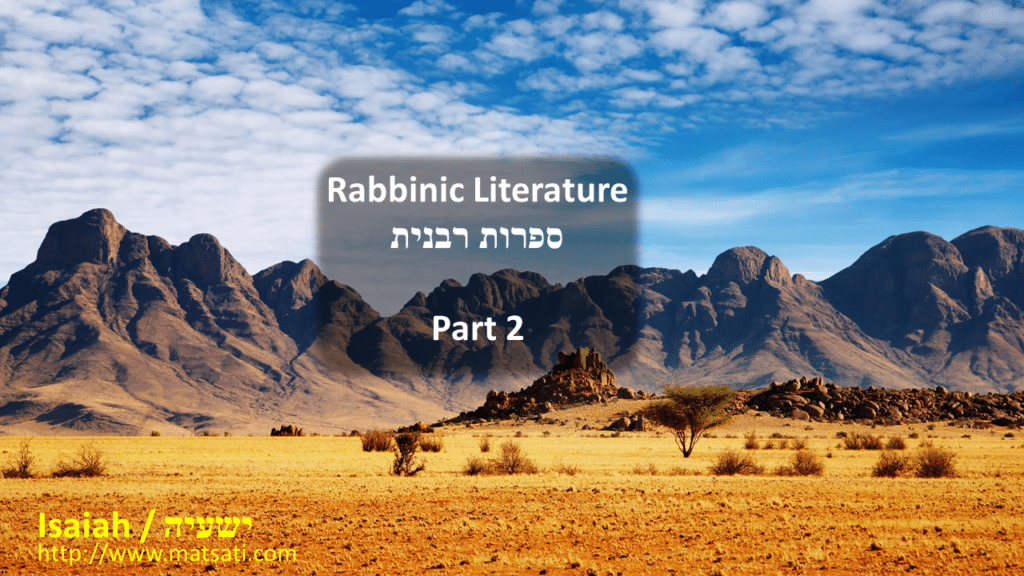
Targum Jonathan interprets and translates Isaiah’s words in the following way:
תרגום יונתן בן עוזיאל אל ישעיה פרק ב:יא-כב
יב אְרֵי יֹומָא עְתִיד לְמֵיתֵי מִן קֳדָם יוי צְבָאֹות עַל כָל גֵיוְתָנַיָא וְרָמֵי לִיבָא וְעַל כָל תַקִיפַיָא וַיִמאְכוּן׃ יג וְעַל כָל מַלכֵי עַמְמַיָא תַקִיפַיָא וְחַסִינַיָא וְעַל כָל טוּרנֵי מְדִינָתָא׃ יד וְעַל כָל טוּרַיָא רָמַיָא וְעַל כָל רָמָתָא מְנֻטְלָתָא׃ טו וְעַל כָל דְיָתְבִין בְמִגדַל רָם וְעַל כָל דְשָרַן בְשוּר כְרִיך׃ טז וְעַל כָל דְיָתְבִין בְנֵיסֵי יַמָא וְעַל כָל דְשָרַן בְבִירָוָת שוּפרָא׃ יז וְתִמאַך רָמוּת אְנָשָא וְיַחְלַש תְקֹוף גֻברִין וְתַקִיף יוי בִלחֹודֹוהִי בְעִידָנָא הַהוּא׃ יח וְטָעְוָתָא גְמֵירָא יְסוּפוּן׃ יט וְיֵיעְלוּן בִמעָרַת טִנָרַיָא וּבִמחִילֵי עַפרָא מִן קֳדָם דְחִילָא יוי וּמִזִיו יְקָרֵיה בְאִתגְלָיוּתֵיה לְמִתבַר רַשִיעֵי אַרעָא׃ כ בְעִידָנָא הַהוּא יְרַחְקוּן בְנֵי אְנָשָא יָת טָעְוָת כַספְהֹון וְיָת טָעְוָת דַהבְהֹון דַעְבַדוּ לְהֹון לְמִסגַד לְטָעְוָתָא וּלצַלמָנַיָא׃ כא לְמֵיעַל בִמעָרָת טִנָרַיָא וּבִשקִיפֵי כֵיפַיָא מִן קֳדָם דְחִילָא יוי וּמִזִיו יְקָרֵיה בְאִתגְלָיוּתֵיה לְמִתבַר רַשִיעֵי אַרעָא׃ כב אִתמְנַעוּ לְכֹון מִלְאִשתַעֲבָדָא לַאְנָשָא בְמַעבְדֵיה דַחלָא דְנִשמַת רוּחַ חַיִין בְאַפֹוהִי אְרֵי יֹומָא דֵין הוּא קַייָם מְחַר לָיְתֹוהִי וּכלָמָא חְשִיב הוּא׃
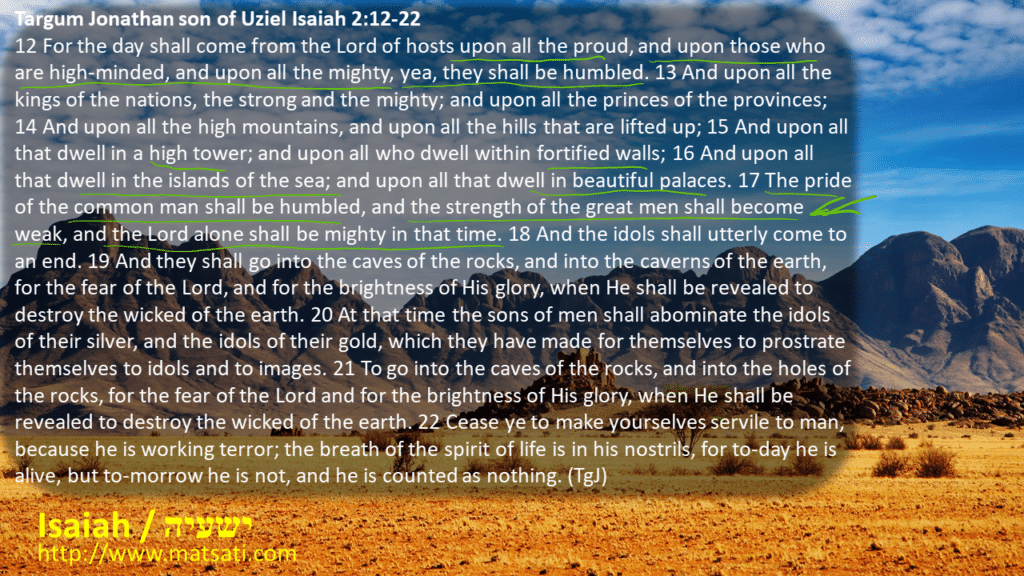
Targum Jonathan son of Uziel Isaiah 2:12-22
12 For the day shall come from the Lord of hosts upon all the proud, and upon those who are high-minded, and upon all the mighty, yea, they shall be humbled. 13 And upon all the kings of the nations, the strong and the mighty; and upon all the princes of the provinces; 14 And upon all the high mountains, and upon all the hills that are lifted up; 15 And upon all that dwell in a high tower; and upon all who dwell within fortified walls; 16 And upon all that dwell in the islands of the sea; and upon all that dwell in beautiful palaces. 17 The pride of the common man shall be humbled, and the strength of the great men shall become weak, and the Lord alone shall be mighty in that time. 18 And the idols shall utterly come to an end. 19 And they shall go into the caves of the rocks, and into the caverns of the earth, for the fear of the Lord, and for the brightness of His glory, when He shall be revealed to destroy the wicked of the earth. 20 At that time the sons of men shall abominate the idols of their silver, and the idols of their gold, which they have made for themselves to prostrate themselves to idols and to images. 21 To go into the caves of the rocks, and into the holes of the rocks, for the fear of the Lord and for the brightness of His glory, when He shall be revealed to destroy the wicked of the earth. 22 Cease ye to make yourselves servile to man, because he is working terror; the breath of the spirit of life is in his nostrils, for to-day he is alive, but to-morrow he is not, and he is counted as nothing. (TgJ)
Jonathan writes in Isaiah 2:12, יב אְרֵי יֹומָא עְתִיד לְמֵיתֵי מִן קֳדָם יוי צְבָאֹות עַל כָל גֵיוְתָנַיָא וְרָמֵי לִיבָא וְעַל כָל תַקִיפַיָא וַיִמאְכוּן׃ 12 For the day shall come from the Lord of hosts upon all the proud, and upon those who are high-minded, and upon all the mighty, yea, they shall be humbled. (TgJ) To be high-minded is not about having high moral or intellectual character. Jonathan writes כָל גֵיוְתָנַיָא וְרָמֵי לִיבָא “all who are proud and elevated hearts.” This refers to the one elevating his or herself up in pride, the likes of which God will bring low all who are proud. Isaiah describes these as being יג וְעַל כָל מַלכֵי עַמְמַיָא תַקִיפַיָא וְחַסִינַיָא וְעַל כָל טוּרנֵי מְדִינָתָא׃ 13 And upon all the kings of the nations, the strong and the mighty; and upon all the princes of the provinces; יד וְעַל כָל טוּרַיָא רָמַיָא וְעַל כָל רָמָתָא מְנֻטְלָתָא׃ 14 And upon all the high mountains, and upon all the hills that are lifted up; טו וְעַל כָל דְיָתְבִין בְמִגדַל רָם וְעַל כָל דְשָרַן בְשוּר כְרִיך׃ 15 And upon all that dwell in a high tower; and upon all who dwell within fortified walls; טז וְעַל כָל דְיָתְבִין בְנֵיסֵי יַמָא וְעַל כָל דְשָרַן בְבִירָוָת שוּפרָא׃ 16 And upon all that dwell in the islands of the sea; and upon all that dwell in beautiful palaces. יז וְתִמאַך רָמוּת אְנָשָא וְיַחְלַש תְקֹוף גֻברִין וְתַקִיף יוי בִלחֹודֹוהִי בְעִידָנָא הַהוּא׃ 17 The pride of the common man shall be humbled, and the strength of the great men shall become weak, and the Lord alone shall be mighty in that time. (TgJ) What we find here is the idea of becoming weak and the Lord alone as being strong. This concept is drawn out according to the Apostolic Writings. We note Isaiah states according to Isaiah 40:31 But they who wait for the Lord shall renew their strength; they shall mount up with wings like eagles; they shall run and not be weary; they shall walk and not faint. (ESV) Note how it is the Lord God Almighty who strengthens. A couple NT references speak in the following way:
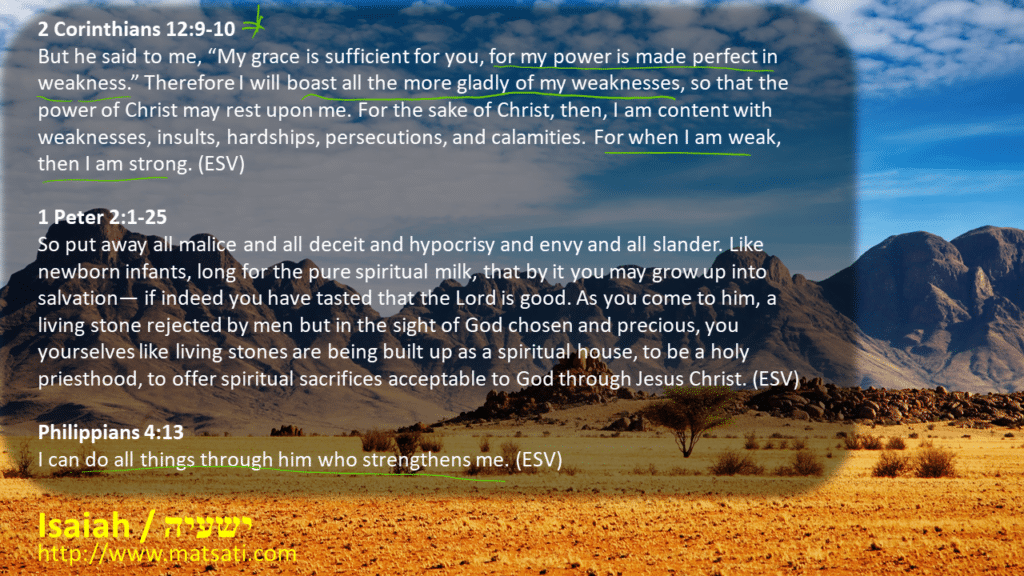
2 Corinthians 12:9-10
But he said to me, “My grace is sufficient for you, for my power is made perfect in weakness.” Therefore I will boast all the more gladly of my weaknesses, so that the power of Christ may rest upon me. For the sake of Christ, then, I am content with weaknesses, insults, hardships, persecutions, and calamities. For when I am weak, then I am strong. (ESV)
1 Peter 2:1-25
So put away all malice and all deceit and hypocrisy and envy and all slander. Like newborn infants, long for the pure spiritual milk, that by it you may grow up into salvation— if indeed you have tasted that the Lord is good. As you come to him, a living stone rejected by men but in the sight of God chosen and precious, you yourselves like living stones are being built up as a spiritual house, to be a holy priesthood, to offer spiritual sacrifices acceptable to God through Jesus Christ. (ESV)
Philippians 4:13
I can do all things through him who strengthens me. (ESV)
When we think about Paul, he trained as a Pharisee and became a zealot of Judaism and of the Torah. (Acts 22:3) We read according to Galatians 1:14, “And I advanced in Judaism beyond many of my contemporaries in my own nation, being more exceedingly zealous for the traditions of my fathers.” In his zealousness for the Torah, he arrested, persecuted, and killed men who believed Yeshua was the promised Messiah. So when we think about Paul, we think of him as being strong, and mighty in word and deed. The description given us according to 2 Corinthians 12:9-10 speak contrary to him being powerful and strong, showing us how God had humbled him in a way that is similar to what we are reading here in Isaiah 2. The point is that if we are not humbling ourselves before God, he will do so. If some trouble has befallen us in some way, shape, or form, then one of the things we should consider is this very thing. What have we allowed in our own lives that is contrary to God’s holy Word or to what He wants in our lives? This is kind of the point of what the Hebrew word תָּמִים (tamim) implies when we read it in the Scriptures. This word is translated as “wholehearted” and is often translated as “perfect” or “blameless” in many bible versions. It is best understood as being wholehearted, from the sense that we are to be innocent before God, approaching Him from an innocence of heart with wholehearted devotion as truly seeking His mercy and grace for helping us to live our lives for Him, and for the forgiveness of sins!
Rashi states the following according to His commentary concerning Isaiah 2:17, יז וְתִמאַך רָמוּת אְנָשָא וְיַחְלַש תְקֹוף גֻברִין וְתַקִיף יוי בִלחֹודֹוהִי בְעִידָנָא הַהוּא׃ 17 The pride of the common man shall be humbled, and the strength of the great men shall become weak, and the Lord alone shall be mighty in that time. (TgJ)
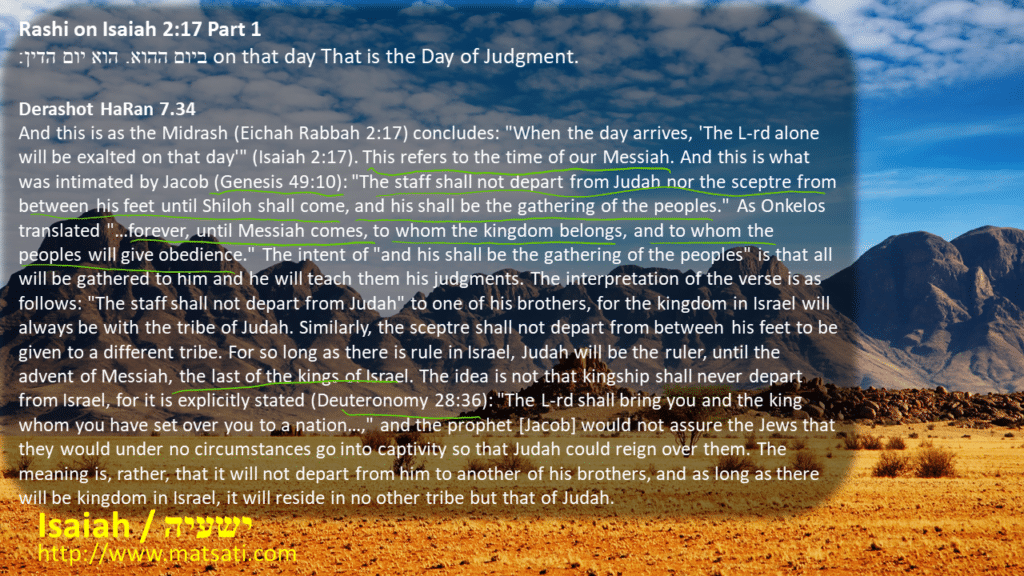
Rashi on Isaiah 2:17 Part 1
ביום ההוא. הוא יום הדין:
on that day That is the Day of Judgment.
We note how Rashi speaks of this verse from the sense of the great day of Judgement. The rabbis consider Isaiah 2 as referring to בְּאַחֲרִ֣ית הַיָּמִ֗ים “in the last days.” We see a similar conclusion by the famous Talmudist and Halachist R’ Nissim ben Ruvein (Ran) in the fourteenth century, according to Derashot HaRan, which is a collection of homilies (Derashos) that are a classic exposition of the fundamentals of the Jewish religion. Derashot HaRan states the following concerning these verses:
Derashot HaRan 7.34
והוא שסיים המדרש לכשיגיע היום ונשגב ה’ לבדו ביום ההוא. וזהו בזמן משיחנו. וזהו שרמז יעקב בהנבאו עליו לא יסור שבט מיהודה וגו’. ושילה הוא מל המשיח כמו שתרגם אונק לוס עד עלמא עד דייתי משיחא דדיליה היא מלכותא. ואמר ולו יקהת עמים כי כלם יתקבצו אליו ויורה להם משפטיו. ופירוש הפסוק הוא כן לא יסור שבט מיהודה לאחד מאחיו. כי המלכות בישראל יהיה לעולם בשבט יהודה. וכן לא יסור מחוקק מבין רגליו כדי להנתן לשבט אחר. שכל זמן שתהיה הממשלה בישראל ימשול בהם יהודה עד שיבא המשיח שהוא סוף מלכי ישראל. אבל אין ענינו שלא יסור לעולם, שמקרא מלא דבר הכתוב יולך ה’ אותך ואת מלכך אשר תקים עליך וגו’. והנביא לא יבטיח את ישראל שלא ילכו בשבי בשום ענין כדי שימלוך עליהם יהודה. אבל ענינו שלא יסור ממנו לאחד מאחיו וכל זמן שתהיה ממשלה לישראל לא תהיה לשבט אחר רק לשבט יהודה:
And this is as the Midrash (Eichah Rabbah 2:17) concludes: “When the day arrives, ‘The L-rd alone will be exalted on that day'” (Isaiah 2:17). This refers to the time of our Messiah. And this is what was intimated by Jacob (Genesis 49:10): “The staff shall not depart from Judah nor the sceptre from between his feet until Shiloh shall come, and his shall be the gathering of the peoples.” As Onkelos translated “…forever, until Messiah comes, to whom the kingdom belongs, and to whom the peoples will give obedience.” The intent of “and his shall be the gathering of the peoples” is that all will be gathered to him and he will teach them his judgments. The interpretation of the verse is as follows: “The staff shall not depart from Judah” to one of his brothers, for the kingdom in Israel will always be with the tribe of Judah. Similarly, the sceptre shall not depart from between his feet to be given to a different tribe. For so long as there is rule in Israel, Judah will be the ruler, until the advent of Messiah, the last of the kings of Israel. The idea is not that kingship shall never depart from Israel, for it is explicitly stated (Deuteronomy 28:36): “The L-rd shall bring you and the king whom you have set over you to a nation…,” and the prophet [Jacob] would not assure the Jews that they would under no circumstances go into captivity so that Judah could reign over them. The meaning is, rather, that it will not depart from him to another of his brothers, and as long as there will be kingdom in Israel, it will reside in no other tribe but that of Judah.
Rabbi Nissim ben Ruvein (Ran) interprets this verse which states, וְתַקִיף יוי בִלחֹודֹוהִי בְעִידָנָא הַהוּא “and the Lord alone shall be mighty in that time” to refer to the time of the Messiah. He connects classical messianic prophetic scriptures from the Torah to this event, Bereshit / Genesis 49:10 “The staff shall not depart from Judah nor the sceptre from between his feet until Shiloh shall come, and his shall be the gathering of the peoples,” where Onkelos translates י לָא יַעְדֵי עָבֵיד שׁוּלְטָן מִדְבֵית יְהוּדָה וְסַפְרָא מִבְּנֵי בְנוֹהִי עַד עַלְמָא עַד דְּיֵיתֵי מְשִׁיחָא דְדִילֵיהּ הִיא מַלְכוּתָא וְלֵיהּ יִשְׁתַּמְעֻן עַמְמַיָּא: “…forever, until Messiah (מְשִׁיחָא) comes, to whom the kingdom belongs, and to whom the peoples will give obedience.” Ran goes on to describe the eternality of the kingship of the Messiah! This is consistent with Isaiah 2:3 and Malachi 1:11-14 which speaks saying, “And he will teach us of his ways, (וְיֹרֵ֙נוּ֙ מִדְּרָכָ֔יו) And we will walk in his paths: (וְנֵלְכָ֖ה בְּאֹרְחֹתָ֑יו) For out of Zion (כִּ֤י מִצִּיּוֹן֙) shall go forth the law, (תֵּצֵ֣א תוֹרָ֔ה) And the word of the Lord from Jerusalem. (וּדְבַר־יְהוָ֖ה מִירוּשָׁלִָֽם).” We note how Jewish thought connects the Mashiakh intimately with these events, of a period of greatness centered by being taught the Torah for the purpose of walking in God’s ways! Learning about God is for the purpose of living our lives for Him, and not for ourselves. This is consistent with one of the major themes in all of Scripture of the imperative to trust in the Lord and not in ourselves! Notice how the Messiah and the Torah are coupled to the word of God going forth and on learning how to walk in God’s ways! This is consistent with Yeshua’s ministry according to the Gospels! This suggests to us that there is only one way, one truth, one life to live for the Lord! This also speaks that there are not many ways and how we walk in God’s way and not in something of our own making, or our own personal righteousness. We must walk in God’s righteousness and truth, and the Lord God Almighty helps us to do these things by the power of His Spirit! These things speak to us that there is only one way to our Father in heaven, and God’s Messiah is at the center of it all! Midrash Tanchuma Burber further expounds upon these things in the following way:
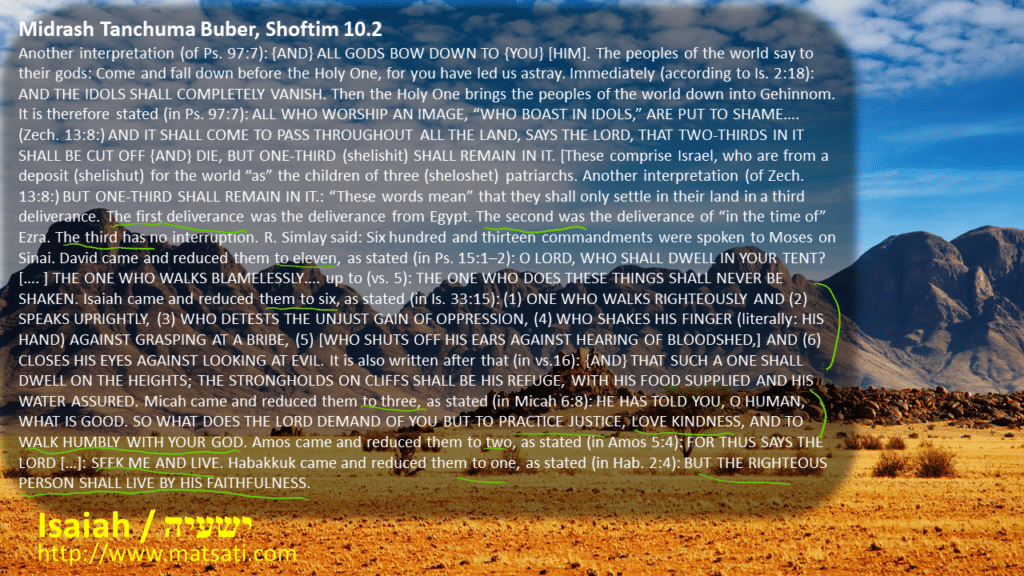
Midrash Tanchuma Buber, Shoftim 10.2
ד”א (וישתחוו לך) [השתחוו לו] כל אלהים. אומרים אומות העולם לאלהיהם, בואו ונשתחוה לפני הקב”ה, שאתם התעיתם אותנו, מיד והאלילים כליל יחלוף (ישעיה ב יח), והקב”ה מוריד אומות העולם לגיהנם, לכך נאמר יבושו כל עובדי פסל וגו’ (תהלים צז ז). והיה בכל הארץ נאום ה’ פי שנים בה יכרתו (ויגועו) [יגועו] והשלישית יותר בה (זכריה יג ח), [אלו ישראל שהם משלישותו של עולם בני שלשת אבות, ד”א והשלישית יותר בה] שאין מתיישבין בארצם אלא בגאולה שלישית, גאולה ראשונה זו גאולת מצרים, שניה זו גאולת עזרא, שלישית אין לה הפסק. אמר ר’ שמלאי תרי”ג מצות נאמרו לו למשה בסיני, בא דוד והעמידן על אחת עשרה, שנאמר ה’ מי יגור באהלך [וגו’] הולך תמים וגו’ (תהלים טו א ב), עד עושה אלה לא ימוט לעולם (שם שם ה), בא ישעיה והעמידן על שש, שנאמר הולך צדקות, ודובר מישרים, מואס בבצע מעשקות, נוער כפיו מתמוך בשוחד, [אוטם אזנו משמוע דמים], עוצם עיניו מראות ברע (ישעיה לג טו), וכתיב בתריה (והוא) [הוא] מרומים ישכון מצודות סלעים משגבו, לחמו ניתן מימיו נאמנים (שם שם טז), בא מיכה והעמידן על שלש, שנאמר הגיד לך אדם מה טוב ומה ה’ דורש ממך כי אם עשות משפט ואהבת חסד והנצע לכת עם אלהיך (מיכה ו ח), בא עמוס והעמידן על שתים, שנאמר כי כה אמר ה’ [וגו’] דרשוני וחיו (עמוס ה ד), בא חבקוק והעמידן על אחת, שנאמר וצדיק באמונתו יחיה (חבקוק ב ד).
Another interpretation (of Ps. 97:7): {AND} ALL GODS BOW DOWN TO {YOU} [HIM]. The peoples of the world say to their gods: Come and fall down before the Holy One, for you have led us astray. Immediately (according to Is. 2:18): AND THE IDOLS SHALL COMPLETELY VANISH. Then the Holy One brings the peoples of the world down into Gehinnom. It is therefore stated (in Ps. 97:7): ALL WHO WORSHIP AN IMAGE, “WHO BOAST IN IDOLS,” ARE PUT TO SHAME…. (Zech. 13:8:) AND IT SHALL COME TO PASS THROUGHOUT ALL THE LAND, SAYS THE LORD, THAT TWO-THIRDS IN IT SHALL BE CUT OFF {AND} DIE, BUT ONE-THIRD (shelishit) SHALL REMAIN IN IT. [These comprise Israel, who are from a deposit (shelishut) for the world “as” the children of three (sheloshet) patriarchs. Another interpretation (of Zech. 13:8:) BUT ONE-THIRD SHALL REMAIN IN IT.: “These words mean” that they shall only settle in their land in a third deliverance. The first deliverance was the deliverance from Egypt. The second was the deliverance of “in the time of” Ezra. The third has no interruption. R. Simlay said: Six hundred and thirteen commandments were spoken to Moses on Sinai. David came and reduced them to eleven, as stated (in Ps. 15:1–2): O LORD, WHO SHALL DWELL IN YOUR TENT? […. ] THE ONE WHO WALKS BLAMELESSLY…. up to (vs. 5): THE ONE WHO DOES THESE THINGS SHALL NEVER BE SHAKEN. Isaiah came and reduced them to six, as stated (in Is. 33:15): (1) ONE WHO WALKS RIGHTEOUSLY AND (2) SPEAKS UPRIGHTLY, (3) WHO DETESTS THE UNJUST GAIN OF OPPRESSION, (4) WHO SHAKES HIS FINGER (literally: HIS HAND) AGAINST GRASPING AT A BRIBE, (5) [WHO SHUTS OFF HIS EARS AGAINST HEARING OF BLOODSHED,] AND (6) CLOSES HIS EYES AGAINST LOOKING AT EVIL. It is also written after that (in vs.16): {AND} THAT SUCH A ONE SHALL DWELL ON THE HEIGHTS; THE STRONGHOLDS ON CLIFFS SHALL BE HIS REFUGE, WITH HIS FOOD SUPPLIED AND HIS WATER ASSURED. Micah came and reduced them to three, as stated (in Micah 6:8): HE HAS TOLD YOU, O HUMAN, WHAT IS GOOD. SO WHAT DOES THE LORD DEMAND OF YOU BUT TO PRACTICE JUSTICE, LOVE KINDNESS, AND TO WALK HUMBLY WITH YOUR GOD. Amos came and reduced them to two, as stated (in Amos 5:4): FOR THUS SAYS THE LORD […]: SEEK ME AND LIVE. Habakkuk came and reduced them to one, as stated (in Hab. 2:4): BUT THE RIGHTEOUS PERSON SHALL LIVE BY HIS FAITHFULNESS.
Midrash Tanchuma Burber speaks concerning these verses in relation to Isaiah 1:18, יח וְטָעְוָתָא גְמֵירָא יְסוּפוּן׃ 18 And the idols shall utterly come to an end. (TgJ) The Midrash speaks to what God expects of His people, and all peoples to live as not being corrupt. This reminds us of Sodom and Gomorrah. We note how Isaiah used Sodom and Gomorrah as an example to these people. The people of Sodom received two strangers and as the narrative goes, the men of the city wanted to have sexual relations with these two angels. The book of Jude in the NT states that the people “indulged in gross immorality and went after strange flesh” (see Jude 1:7). The thing is, sexualy deviance was not unique to Sodom and Gomorrah, as this very thing is taking place today. We don’t see fire and brimstone raining down from heaven. The question is were there other sins leveled against these cities along with their sexual sin? We note how Midrash Tanchuma Burber describes what is expected from God regarding morality, justice, and mercy. The Talmud lists various sins that came along with the charges of sexual immorality. Things such as blasphemy, selfishness robbery, extortion, murder, etc. Ezekiel also describes Judah as Sodom saying the following:
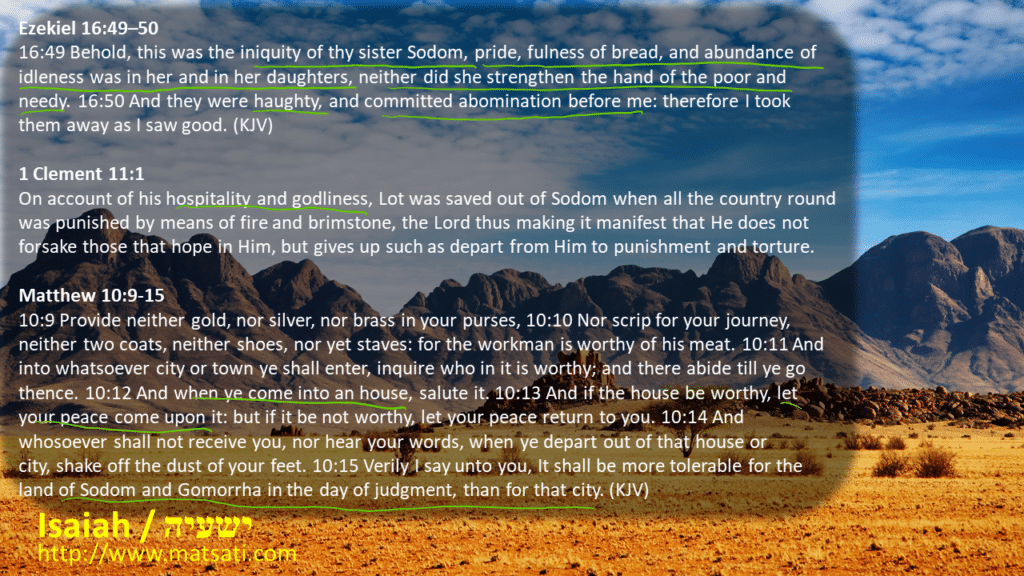
Ezekiel 16:49–50
16:49 Behold, this was the iniquity of thy sister Sodom, pride, fulness of bread, and abundance of idleness was in her and in her daughters, neither did she strengthen the hand of the poor and needy. 16:50 And they were haughty, and committed abomination before me: therefore I took them away as I saw good. (KJV)
Ezekiel describes Sodom coupling pride, idleness, and not helping the poor and needy. They were proud and committed abominations before the Lord. Traditional Jewish thought from the Rabbinic literature states that their primary sins was that of their lack of hospitality towards strangers. Clement, the disciple of Peter, followed the Jewish explanation in that he also saw hospitality and inhospitality as the main issues in the Sodom and Gomorrah story:
1 Clement 11:1
On account of his hospitality and godliness, Lot was saved out of Sodom when all the country round was punished by means of fire and brimstone, the Lord thus making it manifest that He does not forsake those that hope in Him, but gives up such as depart from Him to punishment and torture.
We note a parallel to what Yeshua said to his disciples.
Matthew 10:9-15
10:9 Provide neither gold, nor silver, nor brass in your purses, 10:10 Nor scrip for your journey, neither two coats, neither shoes, nor yet staves: for the workman is worthy of his meat. 10:11 And into whatsoever city or town ye shall enter, inquire who in it is worthy; and there abide till ye go thence. 10:12 And when ye come into an house, salute it. 10:13 And if the house be worthy, let your peace come upon it: but if it be not worthy, let your peace return to you. 10:14 And whosoever shall not receive you, nor hear your words, when ye depart out of that house or city, shake off the dust of your feet. 10:15 Verily I say unto you, It shall be more tolerable for the land of Sodom and Gomorrha in the day of judgment, than for that city. (KJV)
This whole conversation here could allude to the hospitality issue consistent with the interpretation of the sages. The idea of hospitality carries with it the idea of mercy, love, and justice. Those who are proud, arrogant, murderers, the ungodly, they do not know how to show the mercy of God toward others, in fact they refuse to because by nature they do not love the things of God. Because of their sins, they will יט וְיֵיעְלוּן בִמעָרַת טִנָרַיָא וּבִמחִילֵי עַפרָא מִן קֳדָם דְחִילָא יוי וּמִזִיו יְקָרֵיה בְאִתגְלָיוּתֵיה לְמִתבַר רַשִיעֵי אַרעָא׃ 19 And they shall go into the caves of the rocks, and into the caverns of the earth, for the fear of the Lord, and for the brightness of His glory, when He shall be revealed to destroy the wicked of the earth. (TgJ) Rashi makes the following comments concerning Isaiah 2:19.
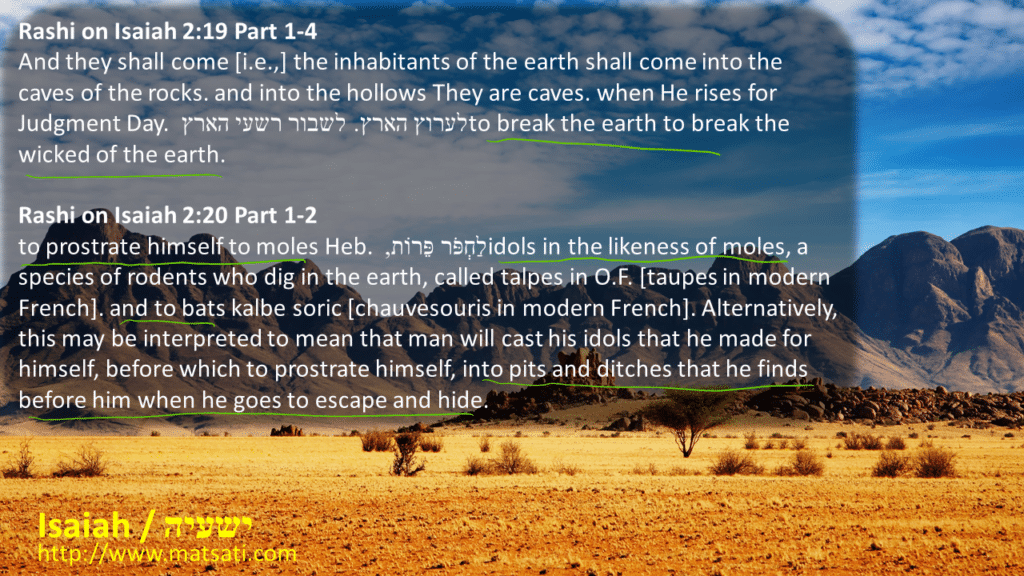
Rashi on Isaiah 2:19 Part 1-4
And they shall come [i.e.,] the inhabitants of the earth shall come into the caves of the rocks. and into the hollows They are caves. when He rises for Judgment Day. לערוץ הארץ. לשבור רשעי הארץ to break the earth to break the wicked of the earth.
The idea of the wicked here is being connected to the breaking of the earth as Rashi states, לערוץ הארץ. לשבור רשעי הארץ “the breaking of the earth.” We note how we are always being drawn back to the Torah, the foundation of all the Scripture. The earth is cursed based upon Bereshit / Genesis 3:17, יז וּלְאָדָם אָמַר כִּי שָׁמַעְתָּ לְקוֹל אִשְׁתֶּךָ וַתֹּאכַל מִן-הָעֵץ אֲשֶׁר צִוִּיתִיךָ לֵאמֹר לֹא תֹאכַל מִמֶּנּוּ אֲרוּרָה הָאֲדָמָה בַּעֲבוּרֶךָ בְּעִצָּבוֹן תֹּאכֲלֶנָּה כֹּל יְמֵי חַיֶּיךָ: “And unto Adam he said, Because thou hast hearkened unto the voice of thy wife, and hast eaten of the tree, of which I commanded thee, saying, Thou shalt not eat of it: cursed is the ground for thy sake; in sorrow shalt thou eat of it all the days of thy life.” It was due to the sin of a man with his wife in the Garden of Eden. Note that they were both complicit in disobeying God’s word. Isaiah is drawing us back to the fundamentals, the reasons for what we see going on in the earth today. Again, these things reveal how important the Torah is for our understanding and interpretation of all of scripture. Without the Torah there is so much we wouldn’t understand.
Isaiah continues according to Targum Jonathan saying, כ בְעִידָנָא הַהוּא יְרַחְקוּן בְנֵי אְנָשָא יָת טָעְוָת כַספְהֹון וְיָת טָעְוָת דַהבְהֹון דַעְבַדוּ לְהֹון לְמִסגַד לְטָעְוָתָא וּלצַלמָנַיָא׃ 20 At that time the sons of men shall abominate the idols of their silver, and the idols of their gold, which they have made for themselves to prostrate themselves to idols and to images. (TgJ) Because of the sinfulness of man and his refusal to seek the Lord, he makes gods of his own. The idea of their gods being made out of silver and gold, draws a significant implication to how money can be a god in one’s life. Note what Rashi states concerning this verse:
Rashi on Isaiah 2:20 Part 1-2
to prostrate himself to moles Heb. לַחְפֹּר פֵּרוֹת, idols in the likeness of moles, a species of rodents who dig in the earth, called talpes in O.F. [taupes in modern French]. and to bats kalbe soric [chauvesouris in modern French]. Alternatively, this may be interpreted to mean that man will cast his idols that he made for himself, before which to prostrate himself, into pits and ditches that he finds before him when he goes to escape and hide.
Notice how Rashi analogizes prostrating to idols as that of prostrating to unclean animals. The connection is to our becoming unclean due to our sins! We note the message here that parallels what we read according to Vayikra / Leviticus and Ezekiel.
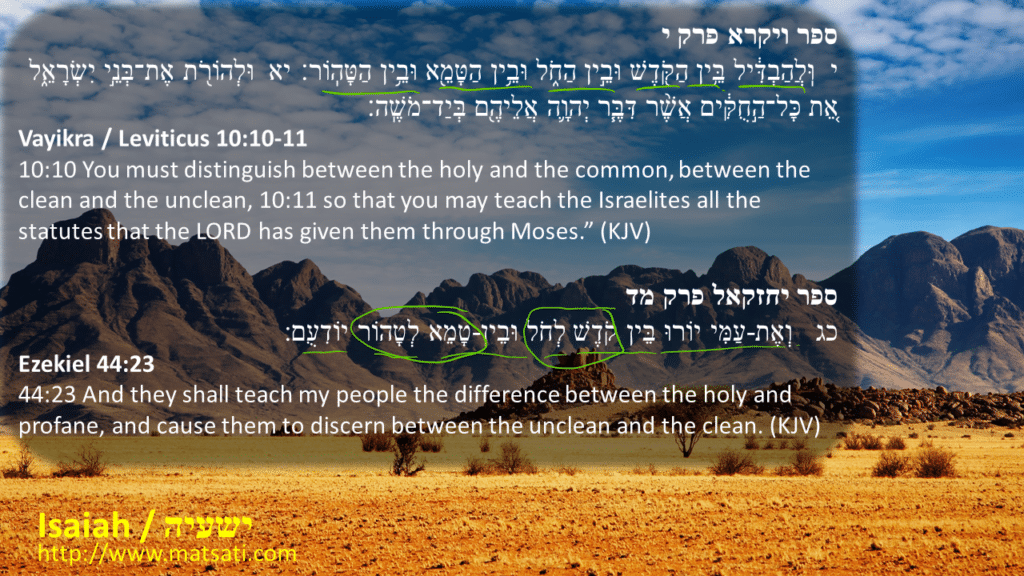
ספר ויקרא פרק י
י וּֽלֲהַבְדִּ֔יל בֵּ֥ין הַקֹּ֖דֶשׁ וּבֵ֣ין הַחֹ֑ל וּבֵ֥ין הַטָּמֵ֖א וּבֵ֥ין הַטָּהֽוֹר׃ יא וּלְהוֹרֹ֖ת אֶת־בְּנֵ֣י יִשְׂרָאֵ֑ל אֵ֚ת כָּל־הַ֣חֻקִּ֔ים אֲשֶׁ֨ר דִּבֶּ֧ר יְהוָ֛ה אֲלֵיהֶ֖ם בְּיַד־מֹשֶֽׁה׃
Vayikra / Leviticus 10:10-11
10:10 You must distinguish between the holy and the common, between the clean and the unclean, 10:11 so that you may teach the Israelites all the statutes that the LORD has given them through Moses.” (KJV)
ספר יחזקאל פרק מד
כג וְאֶת-עַמִּי יוֹרוּ בֵּין קֹדֶשׁ לְחֹל וּבֵין-טָמֵא לְטָהוֹר יוֹדִעֻם:
Ezekiel 44:23
44:23 And they shall teach my people the difference between the holy and profane, and cause them to discern between the unclean and the clean. (KJV)
These two references speak to וּֽלֲהַבְדִּ֔יל בֵּ֥ין הַקֹּ֖דֶשׁ וּבֵ֣ין הַחֹ֑ל וּבֵ֥ין הַטָּמֵ֖א וּבֵ֥ין הַטָּהֽוֹר “make a distinction between what his holy and profane, and unclean and clean.” We are to be conscious of this distinction between the sacred and profane, between what is of God and what is of the flesh. This again draws us back to the creation account as we read according to Bereshit / Genesis 1:3-4, ג וַיֹּאמֶר אֱלֹהִים יְהִי-אוֹר וַיְהִי-אוֹר: ד וַיַּרְא אֱלֹהִים אֶת-הָאוֹר כִּי-טוֹב וַיַּבְדֵּל אֱלֹהִים בֵּין הָאוֹר וּבֵין הַחֹשֶׁךְ: “Then God said, “Let there be light;” and there was light. The spiritual aspect of this is understood as the realm of the holy is to be separated from that which is unclean (inherently sinful). We note that how the Torah lists various ways for a man to become ritually unclean, and this uncleanness can be transmitted (Shemot / Exodus 29:37, Vayikra / Leviticus 6:18, 7:19, 11:32, Bamidbar / Numbers 19:22). For example, a Cohen (priest) can become unclean by touching a corpse. (Vayikra / Leviticus 21:1) Certain foods and animals are considered unclean, etc. On the other hand, there are also things that cause a person to be unclean which are admirable, such as caring for the sick, delivering a baby, and burying the dead. Another example is the ashes of the red heifer, making the priest who sprinkled unclean but the one who was sprinkled clean. This reminds us of the idea of one giving up his purity so that another person could become pure. Based upon all of these things, we understand from the Torah that some things which make a person unclean are not inherently sinful but may be an act of selflessness. At the time of Isaiah, the people were not selfless and giving towards one another, but the entire land had become tamei (unclean) due to injustice, murders, and idolatry, and the lack of hospitality. Because of these things the Lord was coming to set things straight, to clear the land of the ungodly and wicked men, and purify the land. Because of this we read Isaiah saying according to Targum Jonathan, כא לְמֵיעַל בִמעָרָת טִנָרַיָא וּבִשקִיפֵי כֵיפַיָא מִן קֳדָם דְחִילָא יוי וּמִזִיו יְקָרֵיה בְאִתגְלָיוּתֵיה לְמִתבַר רַשִיעֵי אַרעָא׃ 21 To go into the caves of the rocks, and into the holes of the rocks, for the fear of the Lord and for the brightness of His glory, when He shall be revealed to destroy the wicked of the earth. כב אִתמְנַעוּ לְכֹון מִלְאִשתַעֲבָדָא לַאְנָשָא בְמַעבְדֵיה דַחלָא דְנִשמַת רוּחַ חַיִין בְאַפֹוהִי אְרֵי יֹומָא דֵין הוּא קַייָם מְחַר לָיְתֹוהִי וּכלָמָא חְשִיב הוּא׃ 22 Cease ye to make yourselves servile to man, because he is working terror; the breath of the spirit of life is in his nostrils, for to-day he is alive, but to-morrow he is not, and he is counted as nothing. (TgJ) The rabbis of the Talmuld discuss these verses in the following way.
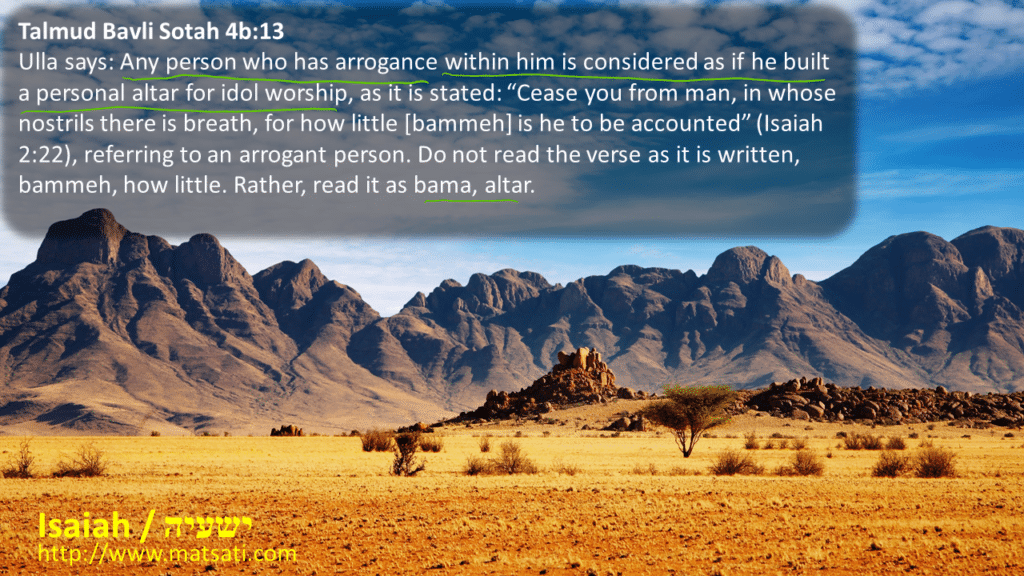
Talmud Bavli Sotah 4b:13
Ulla says: Any person who has arrogance within him is considered as if he built a personal altar for idol worship, as it is stated: “Cease you from man, in whose nostrils there is breath, for how little [bammeh] is he to be accounted” (Isaiah 2:22), referring to an arrogant person. Do not read the verse as it is written, bammeh, how little. Rather, read it as bama, altar.
Notice how the rabbis draw out this idea of being arrogant, having pride, the one who elevates himself above others, esteeming himself as being more significant, it is as if he has created a personal altar for an idol to worship at. This reminds us of what is written in Ezekiel 14.
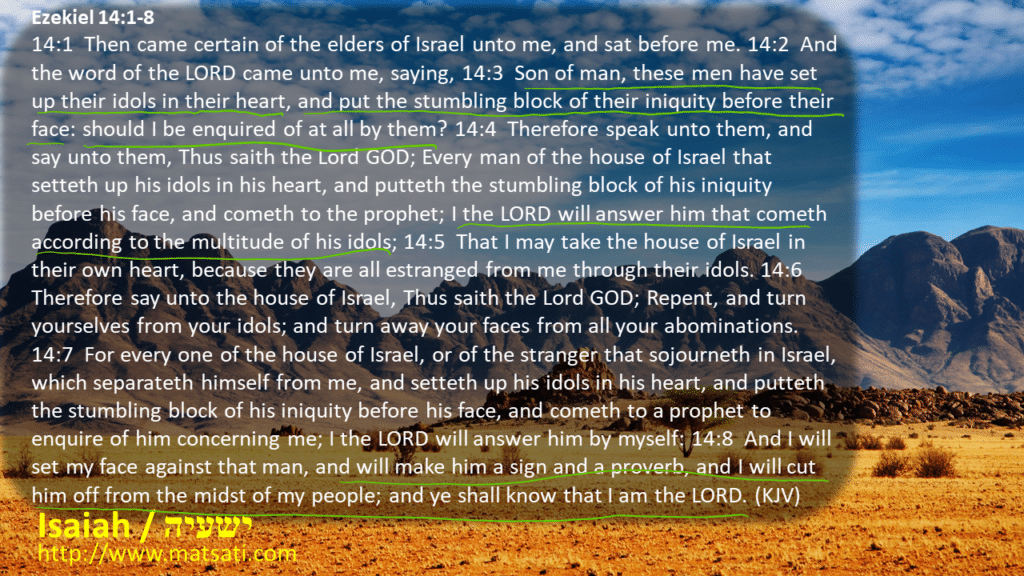
ספר יחזקאל פרק יד
א וַיָּבוֹא אֵלַי אֲנָשִׁים מִזִּקְנֵי יִשְֹרָאֵל וַיֵּשְׁבוּ לְפָנָי: ב וַיְהִי דְבַר-יְהֹוָה אֵלַי לֵאמֹר: ג בֶּן-אָדָם הָאֲנָשִׁים הָאֵלֶּה הֶעֱלוּ גִלּוּלֵיהֶם עַל-לִבָּם וּמִכְשׁוֹל עֲוֹנָם נָתְנוּ נֹכַח פְּנֵיהֶם הַאִדָּרשׁ אִדָּרֵשׁ לָהֶם: ד לָכֵן דַּבֶּר-אוֹתָם וְאָמַרְתָּ אֲלֵיהֶם כֹּה-אָמַר | אֲדֹנָי יְהֹוִה אִישׁ אִישׁ מִבֵּית יִשְֹרָאֵל אֲשֶׁר יַעֲלֶה אֶת-גִּלּוּלָיו אֶל-לִבּוֹ וּמִכְשׁוֹל עֲוֹנוֹ יָשִֹים נֹכַח פָּנָיו וּבָא אֶל-הַנָּבִיא אֲנִי יְהֹוָה נַעֲנֵיתִי לוֹ בָה [בָא] בְּרֹב גִּלּוּלָיו: ה לְמַעַן תְּפֹשֹ אֶת-בֵּית-יִשְֹרָאֵל בְּלִבָּם אֲשֶׁר נָזֹרוּ מֵעָלַי בְּגִלּוּלֵיהֶם כֻּלָּם: ו לָכֵן אֱמֹר | אֶל-בֵּית יִשְֹרָאֵל כֹּה אָמַר אֲדֹנָי יְהֹוִה שׁוּבוּ וְהָשִׁיבוּ מֵעַל גִּלּוּלֵיכֶם וּמֵעַל כָּל-תּוֹעֲבֹתֵיכֶם הָשִׁיבוּ פְנֵיכֶם: ז כִּי אִישׁ אִישׁ מִבֵּית יִשְֹרָאֵל וּמֵהַגֵּר אֲשֶׁר-יָגוּר בְּיִשְֹרָאֵל וְיִנָּזֵר מֵאַחֲרַי וְיַעַל גִּלּוּלָיו אֶל-לִבּוֹ וּמִכְשׁוֹל עֲוֹנוֹ יָשִֹים נֹכַח פָּנָיו וּבָא אֶל-הַנָּבִיא לִדְרָשׁ-לוֹ בִי אֲנִי יְהֹוָה נַעֲנֶה-לּוֹ בִּי: ח וְנָתַתִּי פָנַי בָּאִישׁ הַהוּא וַהֲשִֹמֹתִיהוּ לְאוֹת וְלִמְשָׁלִים וְהִכְרַתִּיו מִתּוֹךְ עַמִּי וִידַעְתֶּם כִּי-אֲנִי יְהֹוָה:
Ezekiel 14:1-8
14:1 Then came certain of the elders of Israel unto me, and sat before me. 14:2 And the word of the LORD came unto me, saying, 14:3 Son of man, these men have set up their idols in their heart, and put the stumbling block of their iniquity before their face: should I be enquired of at all by them? 14:4 Therefore speak unto them, and say unto them, Thus saith the Lord GOD; Every man of the house of Israel that setteth up his idols in his heart, and putteth the stumbling block of his iniquity before his face, and cometh to the prophet; I the LORD will answer him that cometh according to the multitude of his idols; 14:5 That I may take the house of Israel in their own heart, because they are all estranged from me through their idols. 14:6 Therefore say unto the house of Israel, Thus saith the Lord GOD; Repent, and turn yourselves from your idols; and turn away your faces from all your abominations. 14:7 For every one of the house of Israel, or of the stranger that sojourneth in Israel, which separateth himself from me, and setteth up his idols in his heart, and putteth the stumbling block of his iniquity before his face, and cometh to a prophet to enquire of him concerning me; I the LORD will answer him by myself: 14:8 And I will set my face against that man, and will make him a sign and a proverb, and I will cut him off from the midst of my people; and ye shall know that I am the LORD. (KJV)
Note the significance of these things, how the elders came to Ezekiel to seek a word from the Lord but they had remained unfaithful by holding on to their idols. This kind of idol is very difficult to overcome, this thing that is set up within the heart. The imagination of the heart is being described here as the place of transgression and impurity before God. Notice this isn’t just a rabbinic idea, but we also find this concept in the NT according to James 1:15, Then when lust hath conceived, it bringeth forth sin: and sin, when it is finished, bringeth forth death. (KJV, εἶτα ἡ ἐπιθυμία συλλαβοῦσα τίκτει ἁμαρτίαν, ἡ δὲ ἁμαρτία ἀποτελεσθεῖσα ἀποκύει θάνατον.) Note in the Greek text we read the phrase εἶτα ἡ ἐπιθυμία συλλαβοῦσα “then when desire / lust / craving is conceived,” is indicative of the imagination of the heart, exactly what Ezekiel is speaking of. These things reveal to us how it is possible to sin by our thought life as this then leads to living out our sin in the body. Even if we do not live out the sin in our hearts, it is possible to be counted guilty before God as Yeshua said according to Matthew 5 5:21 Ye have heard that it was said of them of old time, Thou shalt not kill; and whosoever shall kill shall be in danger of the judgment: 5:22 But I say unto you, That whosoever is angry with his brother without a cause shall be in danger of the judgment: and whosoever shall say to his brother, Raca, shall be in danger of the council: but whosoever shall say, Thou fool, shall be in danger of hell fire. (KJV) The Apostle John also said according to 1 John 3:15 Everyone who hates his brother is a murderer, and you know that eternal life does not reside in a murderer. Anyone who hates a brother or sister is a murderer, and you know that no murderer has eternal life residing in him. Anyone who hates another brother or sister is really a murderer at heart. (ESV) The message we are receiving from these things is the enslavement of the people to their sins flows through their entire state of being, not just physically, but also psycho-emotional as well! The point of Isaiah 2 was for us to recognize the nature of man, who falls away from truth, righteousness, holiness, and justice. And in the midst of their falling away, we learn about the faithfulness of God to draw His people back to faith and faithfulness according to His Word. We are told according to the prophet Malachi that the love of God is so great, going beyond Israel alone, but into all the world, so much so that there will be a time when even the Gentiles would seek the Lord. This is indicated by Isaiah saying that God’s name will be great among the nations as Isaiah states according to 2:2, “And it shall come to pass (וְהָיָ֣ה׀) in the last days, (בְּאַחֲרִ֣ית הַיָּמִ֗ים) That the mountain of the Lord’s house shall be established (נָכ֨וֹן יִֽהְיֶ֜ה הַ֤ר בֵּית־יְהוָה֙) in the top of the mountains, (בְּרֹ֣אשׁ הֶהָרִ֔ים) And shall be exalted above the hills; (וְנִשָּׂ֖א מִגְּבָע֑וֹת) And all nations shall flow unto it. (וְנָהֲר֥וּ אֵלָ֖יו כָּל־הַגּוֹיִֽם).” This was so important, it is repeated according to Malachi, saying, “And he will teach us of his ways, (וְיֹרֵ֙נוּ֙ מִדְּרָכָ֔יו) And we will walk in his paths: (וְנֵלְכָ֖ה בְּאֹרְחֹתָ֑יו) For out of Zion (כִּ֤י מִצִּיּוֹן֙) shall go forth the law, (תֵּצֵ֣א תוֹרָ֔ה) And the word of the Lord from Jerusalem. (וּדְבַר־יְהוָ֖ה מִירוּשָׁלִָֽם).” This speaks of being taught for the purpose of walking in God’s ways! Learning about God is for the purpose of living our lives for Him, and not for ourselves. This is consistent with one of the major themes in all of Scripture of the imperative to trust in the Lord and not in ourselves! Notice how the Torah is coupled to the word of God going forth and on learning how to walk in God’s ways! This suggests to us that there is only one way, one truth, one life to live for the Lord! This also speaks to the foundation stone of all Scripture, that upon which everything is established concerning God’s Word, is the 5 books of Moshe. We also understand according to the Torah that it is not by our own righteousness that God gives us His blessings (Devarim / Deuteronomy 9:5). We are called to walk in God’s righteous ways because of the grace that God has given us, and by His empowering us through the indwelling of His Spirit! All of these truths speak to us that there is only one way to everlasting life! That way is by trusting in God our Father in heaven, having faith in the One on whom he sent to save us from our sins, Yeshua the Messiah!
